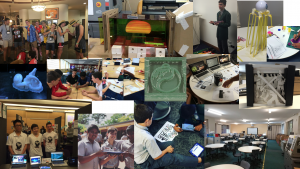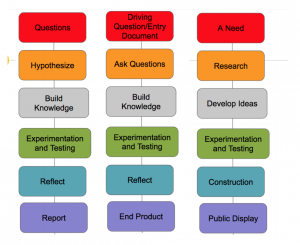#futureschools Part 1: What I spoke about
This week, I was lucky enough to travel to the beautiful city of Melbourne (where good food and coffee runs rampant) in order to attend the Future Schools conference. In reflecting on the two days, I’m going to break this blog post into two: What I spoke about, and what I learnt.
Last year, in my previous job as Innovation Co-ordinator, I was as ked to do a 20 minute speech at future schools on “making drones, robots and makerspaces”. Having set up a few makerspaces now, I still spent a long time trying to figure out what to talk about. I’m not a big fan of talking about myself, and there was so much that we did at Marist, to put it into a 20 minute speech would sound like a list of “here’s what you can do with STEM”. And this list already exists. (Thanks to our Chief Scientist…a much smarter person than me) Em
ked to do a 20 minute speech at future schools on “making drones, robots and makerspaces”. Having set up a few makerspaces now, I still spent a long time trying to figure out what to talk about. I’m not a big fan of talking about myself, and there was so much that we did at Marist, to put it into a 20 minute speech would sound like a list of “here’s what you can do with STEM”. And this list already exists. (Thanks to our Chief Scientist…a much smarter person than me) Em
So, I decided to flip it and talk about all the mistakes we made. Here’s the crux of my speech, which I retitled: “How to fail at: Making drones, robots and makerspaces”.
- Value technology over user experience: It’s more important that people can use the product than it is to have better products. A CNC mill that is chain driven and takes a tenth of the time to do something than a mill that’s rubber band driven isn’t better if the software is so hard to understand it takes a year to figure it out. You want tech that has great hardware, but software is MORE important.
- Employ people that can speak confidently about your vision: This is a controversial one. Yes, it’s important to have poeple that can speak about what you do, but it’s more important to have people that can do the work to make sure that it’s done, and it’s done well. Value hard work and competence over charm. Charm sounds impressive, but generally means that you can talk about stuff that’s not actually happening. What then is more important to student learning? This becomes more important when we talk about putting dangerous technologies like laser cutters (yes, from experience, they catch on fire) but also even supposedly “safe” technologies like soldering irons and hot glue guns (number one cause of accidents in TAS rooms….yes, they’re hot)
- Focus on teachers doing stuff: Students should be the hardest working people in your classroom. The best thing I saw once was when my current principal, stage 3 teacher and I were visiting Emmaus Catholic College. Kid walks in to the room after school, says “Afternoon sir” to the teacher on duty, goes over and starts a 3D print, prints something off on the sticker cutter, cleans up after himself and walks out with a “thanks sir” over the back of his shoulder. This transfers true power of creation to the student, and gives students potential to be independent entrepreneurs.
- Focus on Content: Content is important, but people learn from experiences. Flip it and start with the experience first so that then when you are talking about the content, the student can remember and relate. The best example that I saw of this was our bottle rocket project. Students were using terminology like Aerodynamics, thrust and lift in their first lesson of the project.
- Don’t follow a process: It doesn’t matter what process it is, but if you look at the image below, processes across KLA’s are so similar it doesn’t matter. Let’s teach kids the process of problem solving, not just to “make stuff”

- Don’t make the project: I remember year 7’s always used to think I was a genius at electronics, but it’s really because I’ve made the project a number of times (either in previous years or before I go into the class) and I can predict what problems that they are going to have because I have already made them myself. Sometimes many times. If you do face problems that you’ve not co7me across before, then model problem solving with the kids. “I have no idea how to do that”….”lets work it out together”
And finally….
- If it doesn’t work, Give up: Because that’s the kind of problem solving process we want to model with students.
Stay tuned for part 2: What I learnt at Future Schools
Wow, I so love how you turned the content around and focused on the mistakes-first attempt in learning! Thoroughly enjoyed reading part 1 and now can’t wait for part 2!!!!!!! Well done.